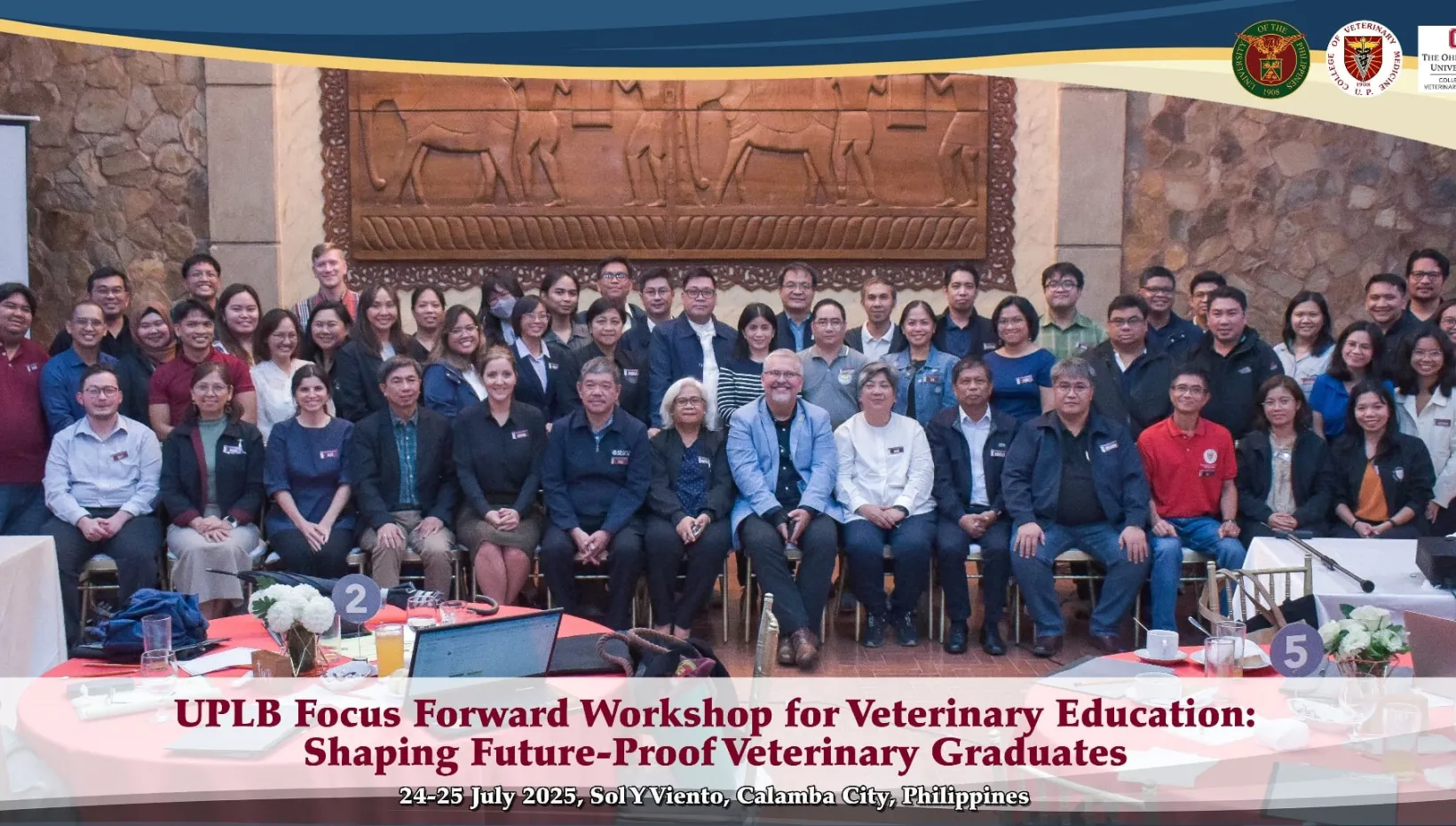Shaping future-proof veterinary graduates in SE-Asia

Originally Published
The Ohio State University College of Veterinary Medicine’s Department of Veterinary Preventive Medicine recently partnered with the University of the Philippines Los Baños College of Veterinary Medicine (UPLB-CVM) to deliver a two-day Focus Forward Workshop designed to enhance the host institution's veterinary curriculum. Held July 24–25, 2025, in Los Baños, Philippines, the event convened UPLB-CVM faculty, recent graduates, and stakeholders from local and national government agencies as well as the private sector.
The workshop’s primary goal was to inform the development of a three-year action plan to better align the UPLB-CVM curriculum with the World Organisation for Animal Health (WOAH) Day 1 Competencies, which underscore the vital role veterinarians play in safeguarding public health, ensuring food safety and protecting the interconnected health of humans, animals and the environment.
The event was organized and facilitated by Armando Hoet, DVM, PhD,DACVPM, professor of veterinary preventive medicine; Amanda Berrian, DVM, MPH, PhD, DACVPM, associate professor of veterinary preventive medicine, associate director of the veterinary public health program and the Dr. Tom Mack Chair in Global One Health; and Alice Matos, DVM, MSc, and James Ferrara, veterinary public health residents; and Matthew Pugh, research coordinator, in close collaboration with long-term partners at UPLB-CVM.
During the first day of the highly interactive, solutions-focused workshop, various speakers presented gaps in the current UPLB curriculum, followed by brainstorming sessions in small discussion groups focused on finding practical interventions to address the described problems. The second day focused on strategic planning, prioritizing the most impactful solutions through real-time polling among participants. The prioritized solution will be used to develop a concrete action plan for implementation over the next three years (2026-28). This participatory approach to selecting innovative solutions ensured that the identified recommendations were grounded in the real-world needs of the veterinary workforce and aligned with national priorities for animal and public health in the Philippines.
This collaboration is part of a larger, ongoing effort to strengthen veterinary education across Southeast Asia and is implemented in collaboration with the Center for Food Security and Public Health at Iowa State University with funding from the Gates Foundation. As a designated regional hub, UPLB-CVM will use the workshop’s solutions to create and implement an action plan and then share best practices with other veterinary schools in the Philippines and throughout the region, including Indonesia and Malaysia. These improvements are expected to bolster national and regional capacity to respond to health threats at the human-animal-environment interface.
Public health opportunities for veterinary students
Veterinary public health offers diverse career paths beyond traditional clinical practice. Students can contribute to disease surveillance, emergency response, outbreak investigation, food safety, environmental health, policy development, regulatory medicine, and One Health initiatives that address the complex connections between people, animals, and ecosystems. Experiences such as curriculum innovation workshops, global health exchanges, and field-based training in epidemiology and zoonotic disease prevention equip future veterinarians with the skills to work in government agencies, international organizations, nonprofits, research institutions and industry.
Veterinary public health residents Alice Matos and James Ferrara played key roles in the workshop’s technical project management. During the event, they also led real-time data consolidation to guide solution prioritization. Reflecting on the experience, Ferrara said: “In my first year of residency, I took a course in project management and studied public health regulations, systems and qualitative data analysis. Working with our internal team and UPLB to prepare and run this workshop gave me the chance to apply those concepts in a real-world setting—and that hands-on experience has truly deepened my understanding of how global public health and veterinary education actually work.”
By participating in projects like the UPLB Focus Forward Workshop, veterinary public health residents gain firsthand experience in collaborative problem-solving, cross-cultural communication, and systems-level thinking—skills essential for protecting global health in an increasingly interconnected world.
For more information, email hoet.1@osu.edu or berrian.4@osu.edu (Principal Investigator).